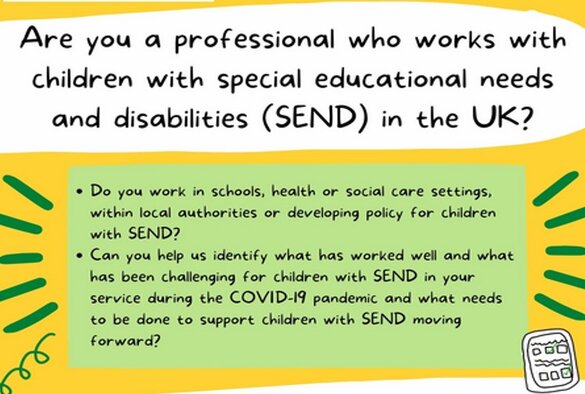
A study has been launched to learn more about the impact of the COVID-19 pandemic and associated lockdowns on children and young people with special educational needs and disabilities (SEND).
Over the next six months, the project team will work with children and young people with SEND their parents/carers and professionals to co-develop key priorities for the future to reduce the long-term effects of COVID-19 and lockdowns for these children.
Special educational needs and disabilities include a range of difficulties or conditions, including those relating to communication and interaction, cognition and learning, social, emotional and mental health difficulties, and physical/sensory needs, as well as those with disabilities and specific learning difficulties.
The study, funded by the National Institute of Health Research (NIHR), is being led by researchers from Liverpool John Moores University, Edge Hill University, the University of Liverpool, Liverpool Health Partners and a steering group of key stakeholders, parents and children and young people with SEND.
The study, which aims to inform policy and funding priorities both locally and nationally is entitled: Ask, Listen, Act – Working Together to Inform the Provision of SEND Support for Children after the COVID-19 Pandemic.
The team are seeking the views and opinions of children and young people with SEND, their parents/carers, local authorities and policymakers, as well as education, health, and social care professionals across the UK through short online surveys, interviews, and stakeholder discussion groups.
The research team have developed surveys that are accessible for as many young people as possible, enabling children aged between five and 15 to answer in a range of ways; simple question and answer formats, drawing and labelling pictures, and using emojis.
Dr Emma Ashworth, Chartered Psychologist and Lecturer in Psychology at Liverpool John Moores University, is the lead for the project.
Dr Ashworth said: “The COVID-19 pandemic has been particularly challenging for some young people with SEND in terms of their education, health and social care, and their needs have often been overlooked.
“As we come out of lockdown and move into recovery post-pandemic, we want to understand more about the impact that the last year has had on these young people, and the ways in which we can buffer any long-term negative effects moving forward.
“We are hoping to hear from as many young people families and professionals as possible, to help us gain a clear picture of the key priorities for the future, for all children with SEND.”
Professor Amel Alghrani, of the University of Liverpool and Professor Lucy Bray of Edge Hill University are Co-Applicants.
Dr Joanna Kirkby is the Research Assistant on the project. The study is being conducted in collaboration with Liverpool Health Partners.
Prof Alghrani said: “The enactment of the Coronavirus Act 2020 contained several measures which directly affected SEND children.
“In May 2020, the Secretary of State made the required notice to bring into force the SEND provisions of the Act which gave rise to the modification of the absolute duty under section 42 of the Children and Families Act 2014 to ‘secure’ special educational provision and ‘arrange’ health provision as specified in an EHC Plan.
“This was replaced by a ‘reasonable endeavours’ duty. Similarly, The Special Educational Needs and Disability (Coronavirus) (Amendment) Regulations 2020 was introduced (and remained in force until the 25th September 2020) which relaxed the timeframes applicable to a range of SEND provision to “as soon as reasonably practicable.
“This survey is important as it provides us with an opportunity to hear from those directly involved and affected by these legal changes and what impact (if any) they had during the Covid-19 pandemic.”
Professor Lucy Bray said: “This project is really important. Children and young people with special educational needs and disabilities have been particularly impacted by COVID lockdowns over the last year.
“Many other projects and surveys have not specifically focussed on children and young people with SEND and the methods used may have excluded many children from joining in and sharing their views.
“We want to hear directly from children about what matters most to them as we ‘move forward’ over the next year, we want to know if they were in charge what would they do? We are really looking forward to seeing all the children’s pictures and hearing about what they think.”
To take part in the survey follow this link: https://ljmupsych.qualtrics.com/jfe/form/SV_2lOxlXLWHxHzQFg
For more information see: www.ljmu.ac.uk/research/centres-and-institutes/research-centre-in-brain-and-behaviour/expertise/forensic-and-social-research/suicide-and-self-harm-research/looking-back-to-move-forward
Follow the study on Twitter @AskListenAct